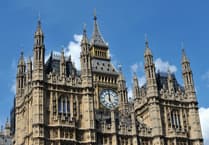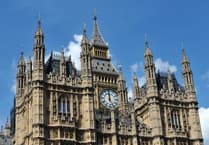A NEW documentary film says Britain’s reintroduced beavers face a fragile future in the wild without more support.
The Beaver Trust’s film says the mammal, two of which have been reintroduced into a Forest of Dean enclosure, could be major allies in tackling climate and extinction crises, but the Government must pledge to get behind the initiative.
The species was hunted to extinction in the UK 500 years ago for their meat, fur and oil, but has been reintroduced in small numbers in such places as the Forest, Devon, Cornwall and Scotland.
The Forest project was temporarily halted in February 2019, when a pair of German beavers relocated to a six-hectare woodland enclosure at Greathough Brook near Upper Lydbrook six months earlier had to be removed due to disease fears.
But they were replaced by a new pair later in the year – a male and a female – this time from the River Tay area in Scotland.
Forestry England staff said at the start of this year both beavers had adpated well to their new surroundings, with video footage showing dam building and tree felling.
But in its new film - Beavers Without Borders - released on YouTube at the weekend, Beaver Trust chief executive James Wallace warns: “It’s a critical time for beavers, with the UK Government deciding on their future in England, and calls for the Scottish Government to allow their relocation in Scotland.
“We hope our film evokes the buzz of life in beaver wetlands, inspires people to welcome beavers back, and helps nurture a reconnection between people and the rest of nature.”
The film follows science communicator Sophie Pavelle on a journey around Britain’s beaver reintroduction sites – hearing from farmers, anglers, scientists and conservationists about the issues, the importance of community support, and how society can learn to live alongside beavers again.
It highlights how beavers are superb ecosystem engineers, with their small dams creating nature-rich wetlands that support wildlife, absorb carbon dioxide, reduce flooding, and improve water quality.
But it warns that beavers remain at risk as a wild species.
The Scottish Government last year declared Scotland’s beavers a protected species, but it still doesn’t allow relocations within its own borders and says the mammal can only spread naturally from their current ranges in Argyll and Tayside.
Although some Scottish beavers are relocated to England, such as the pair in the Forest, the current block on their relocations within Scotland leaves Tayside farmers with little option but to apply for a licence to kill the animals when they damage crops, with 87 beavers – a fifth of the population – shot last year.
The UK Government ruled this summer that England’s first breeding wild beavers could remain in Devon, following the River Otter trial that highlighted their benefits.
But in the Forest and elsewhere, where the beavers have been reintroduced in enclosed areas, the Government has yet to recognise the species as native, or provide a licensing and management system allowing further releases in the wild, despite then Environment Secretary Michael Gove attending the release of the original Greathough Brook beavers in 2018.
A Beaver Trust spokesperson said: “The Government’s national strategy and funding to protect and manage wild beavers should be informed by the lessons learnt by people involved in or affected by reintroductions.”
Those sharing their experiences and expertise in the Beavers Without Borders film include farmer, ecologist and author Derek Gow, who says: “This wonderful film illustrates succinctly the critical importance of the beaver for nature recovery.
“Without the assistance of this creature’s fabled engineering skill sets, it is impossible to imagine a future where nature can begin to recover itself. By returning the beaver to Britain’s impoverished wetland environments, we are blessing them with the ability to heal themselves.”
The film’s writer and director Nina Constable said: “Filming Beavers Without Borders, and meeting individuals dedicated to restoring our natural world, has been an incredible experience. Hopefully the film will raise awareness about what we can do right now to give nature a helping hand, while debunking some myths surrounding beavers and offering hope at a time when we all need it.”
Beavers Without Borders has been supported by The European Nature Trust, Hagan Family Foundation, and SCOTLAND: The Big Picture.
Beaver Trust is a charitable alliance helping communities build resilience to climate change, recover wildlife and reconnect with nature by restoring rivers with beavers. See beavertrust.org for more information.





Comments
This article has no comments yet. Be the first to leave a comment.